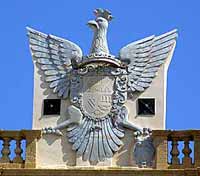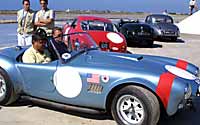|
t r a v e l s n a p zT r a v e l t h e w o r l d f o r j u s t a f e w c l i c k s |
||||
Postcard from Marsala, Sicily |
||||

An eagle crests the town gate of Marsala |
Marsala, situated on Sicily's western coast has given its
name to the famous sweet wine that is produced in this area. The
region, in fact, produces a variety of tipples including a very
decent chardonnay.
|
|
Most cars, however, park outside the old town centre as this
is reserved for pedestrians and the occasional commune car or
delivery vehicle. That is a pleasant change to dodging the
scooters and playing street poker with other drivers (negotiating
your way across a street even at a pedestrian crossing in Italy
is best likened to the card game of poker - it's a process of
who can bluff who in taking right of way!). There are the usual impressive places of worship, and some
good portals to be added to "Doors of Italy" (we'll
let you know the publishing date). The locals are very friendly -
we couldn't get past the gate to the town municipal offices,
the gate guard insisted that we go in and have a look around. If you came here to sample the booze, you can buy the local
wine at the main street shops and the wineries sell direct to the
public at reasonable prices. For more cultural pursuits, there is an extremely impressive
display of ancient wall tapestries up a narrow staircase in a
building at the rear of the cathedral. Just north of Marsala you join "The Salt Road", a
delightful tourist route that follows the coast where sea salt
has been collected for centuries. Some experts suggest that
process could have been in practice as far back as the 14th
century. |
|
|
A rally along the salt coast. 
In ancient times when you sat down to dinner, your position in relation to the salt on the table indicated your status. Below the salt was not a good place to be. I betcha these guys sit above the salt. |
Sea water is pumped into a series of shallow basins that look
a bit like paddy fields. As the water evaporates, the salt
solution that remains becomes more and more concentrated.
Eventually a crust forms and the salt is collected into huge
dunes which are then covered with tiles and left to dry. |